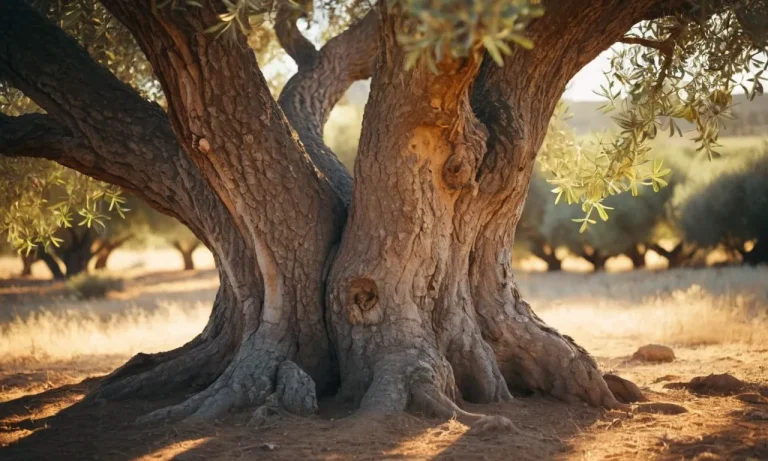The tiny mustard seed holds deep spiritual meaning and significance across religions and faiths. If you’re pressed for time, here’s the key point: the mustard seed’s small size represents humility and faith, with the seed growing into something much larger symbolic of the growth of faith and the spread of spiritual teachings.
In this comprehensive guide, we’ll explore the varied spiritual meanings behind the modest mustard seed. We’ll cover its significance in Christianity, Hinduism, Buddhism, Islam, and more. We’ll also examine mustard seeds in ancient texts, parables, myths and metaphor.
Read on for a deep dive into the surprising spiritual symbolism packed into this tiny seed.
The Mustard Seed in Christianity and the Bible
The Parable of the Mustard Seed
In Matthew 13:31-32, Jesus tells the Parable of the Mustard Seed to describe the kingdom of God. He says, “The kingdom of heaven is like a mustard seed, which a man took and planted in his field. Though it is the smallest of all seeds, yet when it grows, it is the largest of garden plants and becomes a tree, so that the birds come and perch in its branches.”
This parable means that the message of God’s kingdom, which started small like a tiny mustard seed, will grow exponentially to encompass people across nations and cultures. Just as the tiny mustard seed grows into a large tree that provides shelter, the kingdom of God grows from humble beginnings to offer spiritual shelter for people across the world.
Mustard Seeds and Faith
In Matthew 17:20, Jesus referred to mustard seeds again to make a comparison about faith: “Truly I tell you, if you have faith as small as a mustard seed, you can say to this mountain, ‘Move from here to there,’ and it will move. Nothing will be impossible for you.”
Here, Jesus uses the mustard seed, the smallest seed known in that part of the world, to illustrate that faith starts small but has immense potential. With genuine and sincere faith, even if it starts as tiny as a mustard seed, one can accomplish great things that may seem impossible.
This offers encouragement that God can do amazing things through anyone no matter how small or inadequate we may feel.
Additional Biblical References
A couple other biblical references involving mustard seeds demonstrate how significant this tiny seed was in Jesus’s teaching and ministry:
- In a parable in Mark 4:30-32, Jesus compared the mustard seed to the kingdom of God growing from small beginnings to bearing fruit around the world.
- In Luke 17:6, Jesus told his disciples that with faith the size of a mustard seed, they could command a mulberry tree to uproot itself and plant itself in the sea.
So in Jesus’s preaching, he used the imagery and properties of the tiny mustard seed to illustrate profound spiritual truths about the expansive growth of God’s kingdom through faith. This humble, unassuming seed conveyed great meaning in ways his listeners could easily understand from the natural world around them.
Hindu Beliefs About Mustard Seeds
Significance in Hindu Texts
Mustard seeds hold profound symbolic meaning in Hinduism. Several ancient Hindu scriptures, including the Upanishads and Puranas, extol the divine qualities of humble mustard seeds. The seeds represent potential and possibility – just as a tiny mustard seed can grow into a vast plant, spiritual truths have the power to expand one’s consciousness boundlessly.
An age-old Hindu parable likens the human soul to a mustard seed placed in the garden of the world. When nurtured with wisdom, compassion, and righteous living, the soul flowers into the splendid tree of enlightenment.
The Katha Upanishad declares that the Purusha or Supreme Soul dwells in the city of eleven gates – referring to the mustard seed. Other texts say deities reside in specks of dust smaller than mustard seeds!
Several Hindu legends credit the popularization of mustard seeds to the sage Parashara. When plague ravaged the land, Parashara subsisted only on these seeds for sustenance. After the scourge passed, Parashara introduced their cultivation to help humanity. Isn’t that amazing?
Mustard Seeds in Hindu Rituals and Ceremonies
From birth ceremonies to last rites, mustard seeds feature prominently in Hindu customs thanks to their purifying essence. During important new beginnings like moving to a new home, parents coat children’s heads with a mustard paste for luck and protection.
Newlyweds often apply this auspicious mix on wedding nights.
To invoke Ganesha’s blessings, Hindus scatter mustard seeds while laying foundations for buildings. During housewarming ceremonies, mustard seeds placed in various corners guard against evil influences. Their crackling sounds driving away demons!
But the most widespread use is in wedding rituals. The warmth of mustard seeds symbolizes marital bliss. So during sankalpa, mothers sprinkle these over brides and grooms – blessing them with everlasting love. Additionally, married women apply mustard seed paste for solah sringar on festivals.
Truly, mustard seeds cement bonds eternally!
| Hindu Text | Significance of Mustard Seeds |
|---|---|
| Katha Upanishad | Dwelling place of Supreme Soul |
| Hindu Legends | Sage Parashara aided cultivation |
The Role of Mustard Seeds in Buddhism
The Mustard Seed as a Metaphor in Buddhist Teachings
In Buddhism, the tiny mustard seed is used to convey meaningful spiritual lessons. Mustard seeds are one of the smallest seeds, yet can grow into large mustard plants. This symbolizes the vast potential within each person to cultivate wisdom and compassion.
As Buddhist teachings state, “Even as a solid rock is unshaken by the wind, so also, the wise are unshaken by praise or blame”. The mustard seed reminds us that big transformations and realizations can come from humble beginnings with persistent effort.
Mustard Seeds in Buddhist Rituals and Practices
Mustard seeds play a practical role in some Buddhist rituals. In Mahayana Buddhist funerals, five mustard seeds may be placed on the eyes or mouth of the deceased to represent blessings for the next rebirth.
The seeds can also be mixed into offerings of water which are symbolically poured on altars to quench ancestors’ thirst. Additionally, some lay Buddhists wear bracelets with mustard seeds representing mindfulness. When the bracelet is jostled, the seeds make noise, reminding the wearer to be present.
A famous Zen koan asks students “What is the meaning of Bodhidharma coming from the West?” One answer given was simply “The cypress tree in the courtyard,” using mundane imagery to spark insight, much like a tiny mustard seed.
Islamic Perspectives on Mustard Seeds
References in the Quran and Hadith
In Islam, the mustard seed holds great spiritual meaning and significance. It is referenced in both the Quran and hadith (sayings of Prophet Muhammad PBUH). In one verse in the Quran, Allah compares faith to “a mustard seed, which, when planted in the ground, is the smallest of all seeds” but when grows becomes “the largest of garden plants” (Quran 31:16).
This shows how something very small can flourish into something great with proper care and nurturing, just like faith.
There is also a hadith that highlights the power of sincere faith even if it is little. Prophet Muhammad PBUH said: “If you have faith like a mustard seed, you will say to this mountain, ‘Move from here to there,’ and it will move” (Sahih Bukhari).
This demonstrates how strong and meaningful faith can be, even if it starts very small.
Symbolic Meaning in Islam
Beyond direct religious references, the mustard seed also carries profound symbolic meaning in Islam:
Truly, the delicate mustard seed and its growth cycle reflect some of the most important Islamic virtues – patience, dedication, nurturing care, and an understanding that mighty results have humble beginnings with the grace of Allah (God).
It inspires deeper faith and commitment to bettering oneself spiritually.
Mustard Seeds in Other Faiths and Cultures
Pagan Beliefs
In some pagan traditions, mustard seeds represented fertility and vitality. Ancient Celtic rituals used mustard seeds to promote abundance for the coming year. The seeds were seen as containing the spark of new life within them, which would grow into something greater when nurtured.
Chinese Folklore
There is an old Chinese tale about a poor farmer who carefully tended to his crop of mustard seeds. Though his harvest was meager, he shared the precious seeds generously with his neighbors. This act of kindness was rewarded when the mustard seeds multiplied miraculously, allowing the farmer to sell his crop and live comfortably.
Native American Traditions
Some Native American tribes viewed the mustard plant as a sacred medicine and incorporated it into spiritual rituals for cleansing and protection. The Blackfoot nation told stories of how mustard seeds helped sustain their ancestors during times of hardship on long journeys across the plains.
Legends of the Earth recounts such tales passed down through oral tradition.
Conclusion
Across religions, cultures, and time, the humble mustard seed carries immense symbolic weight. This tiny seed represents the potential for growth, from modest beginnings to great lengths. It inspires deep reflection on the nature of faith, and the power within each of us to create change.
The parables and provable properties of the mustard plant will likely continue to hold spiritual resonance for generations to come.






